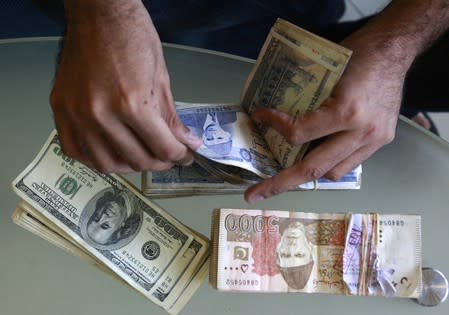World Bank lends $918 million for Pakistan tax reforms

By Asif Shahzad
ISLAMABAD (Reuters) - Pakistan and the World Bank signed on Tuesday a $918 million loan agreement to support the economy, reform the tax system and broaden the revenue base.
Low rates of tax collection have long been one of the biggest obstacles to economic development in Pakistan, which has a large informal economy and a fast-expanding population of 208 million people.
Only 1.8 million people file income tax returns.
Under one of three separate programmes, the World Bank will lend Pakistan $400 million to contribute to a sustainable increase in domestic revenue by broadening the tax base and facilitating compliance, the finance ministry said.
The programme's targets include increasing the tax to gross domestic product ratio to 17 percent, raising the number of active taxpayers to 3.5 million, reducing the compliance burden of paying taxes and improving the efficiency of customs controls.
Another $400 million will go to higher education to support research in strategic sectors of the economy, the ministry said in a statement. The remaining $118 million would be spent on revenue mobilisation and resource management in northwestern Khyber Pakhtunkhwa province, it said.
"These three projects represents future areas where Pakistan is investing in its people," the World Bank's country director, Patchamuthu Illangovan, said after signing the agreements.
The government last week targeted a sharp increase in tax revenues as it presented plans for next year's budget, targeting tax revenues of 5.55 trillion rupees ($36.80 billion), up 25%, an ambitious goal as the government failed to hit the last fiscal year's goal of 4.44 trillion rupees.
Analysts are doubtful the target can be met.
Prime Minister Imran Khan's government is seeking to stabilise a wobbly economy with the IMF loan agreed in principle but contingent on Pakistan pushing ahead with reforms and measures to curb ballooning current and fiscal account deficits.
The government has already slashed its year to June 2019 growth forecast to 3.3% from the 6.2% predicted at the time of the last budget. The IMF's estimates growth of about 2.9%.
The government has trimmed its growth estimate for the coming year to 2.4%.
Inflation, which hit 9% in May, is expected to come in at 11-13% during the 2019/2020 fiscal year.
(Writing by Asif Shahzad; Editing by Robert Birsel)
